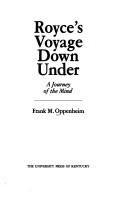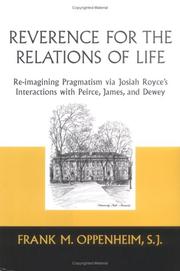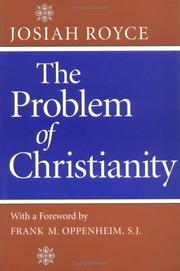| Listing 1 - 9 of 9 |
Sort by
|
Book
ISBN: 0813164060 9780813164069 1322600767 9781322600765 0813154057 9780813154053 Year: 1980 Publisher: Lexington, Kentucky : The University of Kentucky Press,
Abstract | Keywords | Export | Availability | Bookmark
 Loading...
Loading...Choose an application
- Reference Manager
- EndNote
- RefWorks (Direct export to RefWorks)
Josiah Royce's voyage to the South Seas in 1888, undertaken on his physician's advice, restored the philosopher to full physical and mental vigor. What is not so well known is that after a few months of sailing Royce began to ""bag new game,"" as he put it, in his philosophical pursuits. Frank M. Oppenheim examines Royce's writings from this year of travel, including his correspondence and the notes he made on his reading, and finds there the seeds of much of his later thought.While Professor Oppenheim is careful not to overstate the importance of this year of travel in the development of Royc
Book
ISBN: 0268016429 Year: 1993 Publisher: Notre Dame University of Notre Dame press
Abstract | Keywords | Export | Availability | Bookmark
 Loading...
Loading...Choose an application
- Reference Manager
- EndNote
- RefWorks (Direct export to RefWorks)
Royce, Josiah --- Ethics.

ISBN: 0813113946 Year: 1980 Publisher: Lexington University press of Kentucky
Abstract | Keywords | Export | Availability | Bookmark
 Loading...
Loading...Choose an application
- Reference Manager
- EndNote
- RefWorks (Direct export to RefWorks)

ISBN: 0268159874 9780268159870 0268040192 9780268040192 0268159866 9780268159863 Year: 2005 Publisher: Notre Dame, Indiana ; London, [England] : University of Notre Dame Press,
Abstract | Keywords | Export | Availability | Bookmark
 Loading...
Loading...Choose an application
- Reference Manager
- EndNote
- RefWorks (Direct export to RefWorks)
Josiah Royce and William James lived in Cambridge, Massachusetts, on Irving Street, just two doors apart, and Charles Peirce grew up only blocks away. John Dewey was born and educated in nearby Vermont. These four great thinkers shared more than geographic space; they engaged in a series of formative philosophical discussions. By tracing the interactions of Royce (1855-1916) with James, Peirce, and Dewey, Oppenheim "re-imagines pragmatism" in a way that highlights the late Royce's role as mediator and favors the "seed-plant" image of O. W. Holmes, Jr., over the corridor image of Papini. Josiah Royce emphasized that communities of all sizes-ranging from families to towns-needed "reverence for the relations of life" not only to thrive but to survive. This theme permeates the dialectic of Royce's interactions with Peirce, James, and Dewey. Oppenheim analyzes the agreement and disagreement of these thinkers on the method and content of philosophy, skepticism and intelligibility, and nominalism and intentionality, as he uncovers their varied stances toward transcendent Reality. Oppenheim repudiates Ralph Barton Perry's tactic of using Royce as a foil to display James positively, by offering a richer portrait of Royce. Oppenheim calls attention to Royce's "doctrine of two levels" and its effects on the distinction of human and super-human, by showing the contrast of Royce's "third attitude of will" against two primarily self-centered attitudes of will, and by examining the roles of Spirit, Community, and semiotic process in Royce's late thought.
Pragmatism. --- Royce, Josiah, --- Peirce, Charles S. --- James, William, --- Dewey, John, --- Pragmatism --- Royce, Josiah
Book
ISBN: 026801633X Year: 1987 Publisher: Notre Dame University of Notre Dame press
Abstract | Keywords | Export | Availability | Bookmark
 Loading...
Loading...Choose an application
- Reference Manager
- EndNote
- RefWorks (Direct export to RefWorks)
Royce, Josiah, --- Royce, Josiah --- Religion.

ISBN: 0268040192 Year: 2005 Publisher: Notre Dame University of Notre Dame press
Abstract | Keywords | Export | Availability | Bookmark
 Loading...
Loading...Choose an application
- Reference Manager
- EndNote
- RefWorks (Direct export to RefWorks)
Pragmatism --- Dewey, John, --- James, William, --- Peirce, Charles S. --- Royce, Josiah

ISBN: 9780813210728 0813210720 Year: 2001 Publisher: Washington: Catholic university of America press,
Abstract | Keywords | Export | Availability | Bookmark
 Loading...
Loading...Choose an application
- Reference Manager
- EndNote
- RefWorks (Direct export to RefWorks)
Book

ISBN: 9780823255306 Year: 2014 Publisher: New York, NY
Abstract | Keywords | Export | Availability | Bookmark
 Loading...
Loading...Choose an application
- Reference Manager
- EndNote
- RefWorks (Direct export to RefWorks)
Multi

ISBN: 9780823255306 9780823255283 Year: 2014 Publisher: New York, N.Y. Fordham University Press
Abstract | Keywords | Export | Availability | Bookmark
 Loading...
Loading...Choose an application
- Reference Manager
- EndNote
- RefWorks (Direct export to RefWorks)
| Listing 1 - 9 of 9 |
Sort by
|

 Search
Search Feedback
Feedback About UniCat
About UniCat  Help
Help News
News